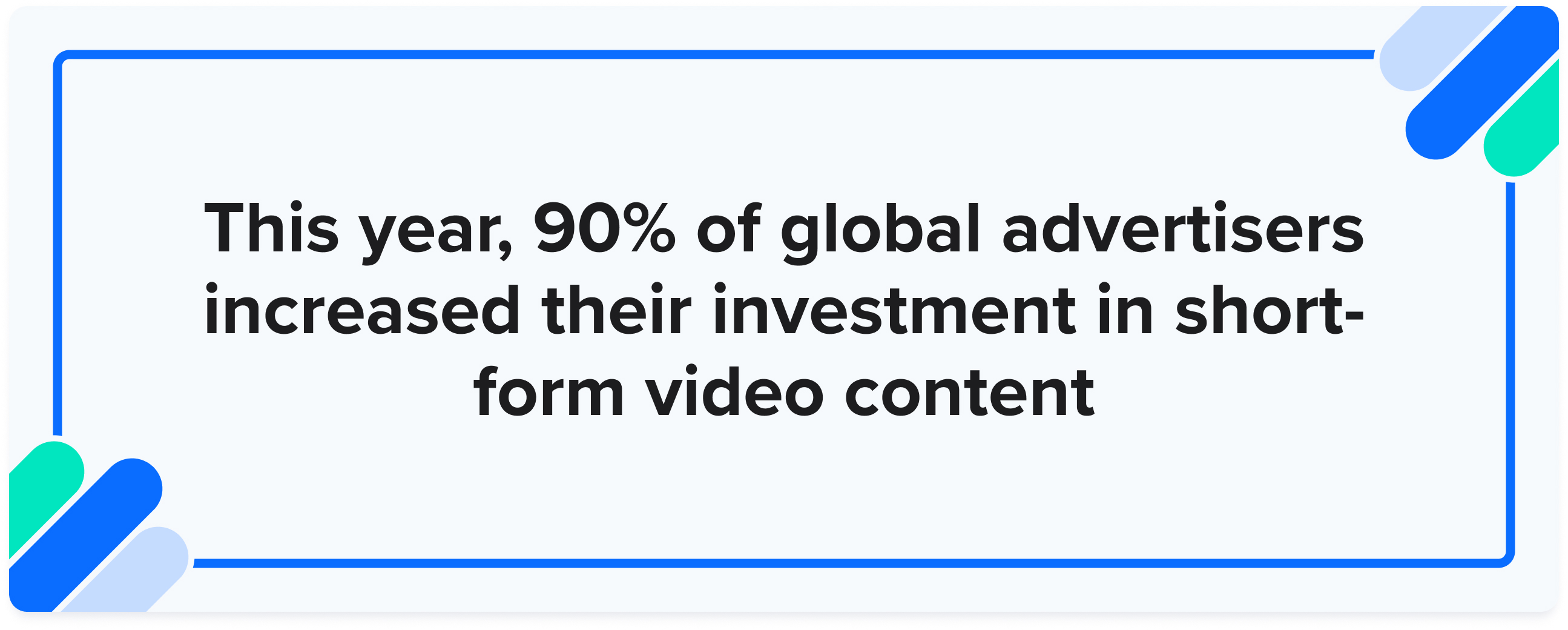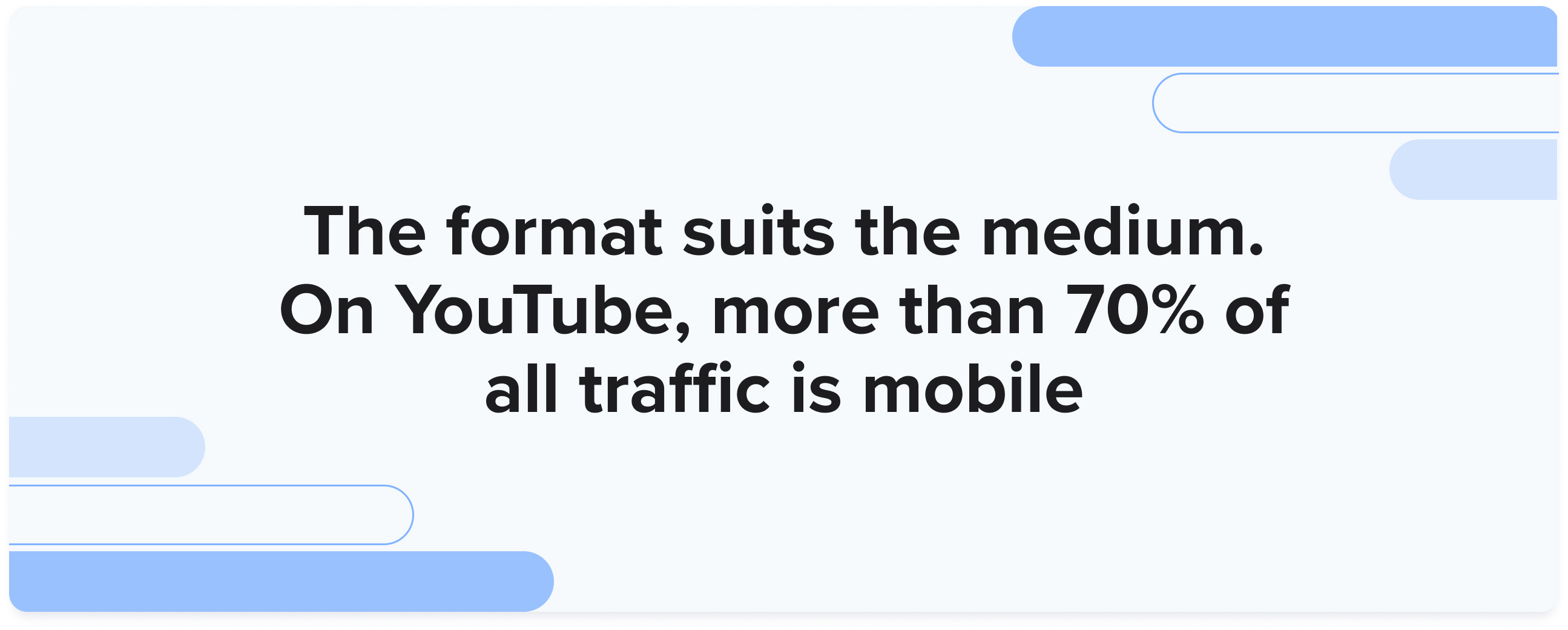Join 40,000+ sales and marketing pros who receive our weekly newsletter.
Get the most relevant, actionable digital sales and marketing insights you need to make smarter decisions faster... all in under five minutes.
Why Short-Form Video Is a Vital Tool for Reaching Your Audience

Sep 25, 2023
This year, 90% of global advertisers increased their investment in short-form video content. And that’s no surprise to me, a video trainer who works on the front lines with clients. Short-form video is everywhere. Of course, it’s on Instagram and TikTok, but short-form video is also on LinkedIn — and it’s heavily promoted on YouTube.

In short, wherever your audience hangs out online, they’re consuming short-form video. Which makes it an essential part of any modern marketing strategy.
To learn more about what it is and why you need it — as well as tips for getting started — keep reading.
Short-form video: What is it?
As the name suggests, short-form videos are, well, short. They may be as long as a minute, or even 90 seconds, but are usually 30 seconds or less. Some are as short as 10 seconds.
These videos are vertically-oriented (think: shot on a phone), and often play on a loop (or auto-play into the next one, suiting short audience attention spans.
Following in the popular footsteps of TikTok, platforms are prioritizing these kinds of videos, which boosts their reach. Instagram leaned into Reels, while YouTube did the same with Shorts.
Earlier this year, HubSpot found most marketers reported short-form video having the best ROI compared to all other media formats.

And it makes sense. The format suits the medium. On YouTube, more than 70% of all traffic is mobile, so it makes sense that the content would be prioritized to the device.
Short-form content lives on discovery platforms
Let me ask you this: Have you ever been scrolling on social media and come across a product you never knew existed — maybe even one that solved a problem you didn’t know you had — and bought it right away?
Yeah, me too. Social platforms know a ton about you, from brands you follow to posts you’ve liked, and they serve up content that fits your profile.
When you’re on social media, you’re in a very different mindset than when you’re using a search engine. If you’re typing a question into Google, you have some idea of what you’re looking for. You have some need that’s brought you there.
When you’re on social media, you’re in a different headspace. You’re there to scroll through and see what you find. Pictures of your sister’s vacation, weird political posts from that friend you haven’t talked to since high school, you know, that kind of thing. You’re in a mindset to discover.
Some marketers call social media sites discovery platforms.
Because short-form video lives on discovery platforms, you have a chance of reaching people who are not even in the awareness stage of the buyer’s journey yet.
They’re pre-awareness.
And this is a goldmine.

By the time someone enters the awareness stage, they’ve already started to narrow down their options. If they google best chiropractors near me, for instance, they’ve already decided that a chiropractor (not, say, a massage therapist or an acupuncturist) is what they need.
Discovery platforms let you connect with a huge audience of potential buyers BEFORE they decide what their problem is.
How to make short-form video
Short-form videos are typically less produced than other types of video. This means the expected threshold for quality is lower, which means less scripting and less editing.
You should still be doing your best work, but think of these like as crafting a social media post as opposed to a blog article. Shorter, quicker, snappier, more consumable.
A few things to keep in mind:
- Short-form videos are less formal. They can be funny or silly, but you should stay true to your brand. So, have fun, but remember that nothing looks worse than a brand chasing and missing a trend.
- Know where your audience hangs out. Talk to your customers. See where they spend their time online. Find your workhorse channel(s) and invest your time there. Don’t spread yourself thin trying to go after every channel.
- …But don’t forget about mindset. Just because your audience is on TikTok, it doesn’t mean that’s the best place for them to discover what you sell. When I’m on Instagram I don’t want to learn about payroll software. When I’m on LinkedIn, I don’t want to learn about fashion.
- Bad content is nearly invisible. Content that falls flat quickly fades away. Be ready to experiment. Some things will work, some things won’t.
- Use the platform tools. When you use native video editors and filters, platforms are more likely to boost your content. So, rather than producing the video in Adobe or Canva or somewhere else, think about making it right in Instagram.
Don’t lose sight of the purpose of video
As you experiment with short-form content, don’t lose sight of why you’re making video content in the first place: to educate (and possibly entertain) your audience. While you can be playful and funny, you should always strive to be authentic.
.jpg)
Make videos that build trust with your brand.
Not sure how to do that? Show your people. Show your process. Show what makes you unique. If you’re a manufacturer, a 30-second video of your facility might seem commonplace to you, but it could be fascinating to your audience. If you’re an electrician, make a quick video of you upgrading an electrical panel.
If you’re not sure which videos your audience is looking for, come and talk to us. We help businesses just like yours build trust — and build their brand — through video content.
Free Assessment: